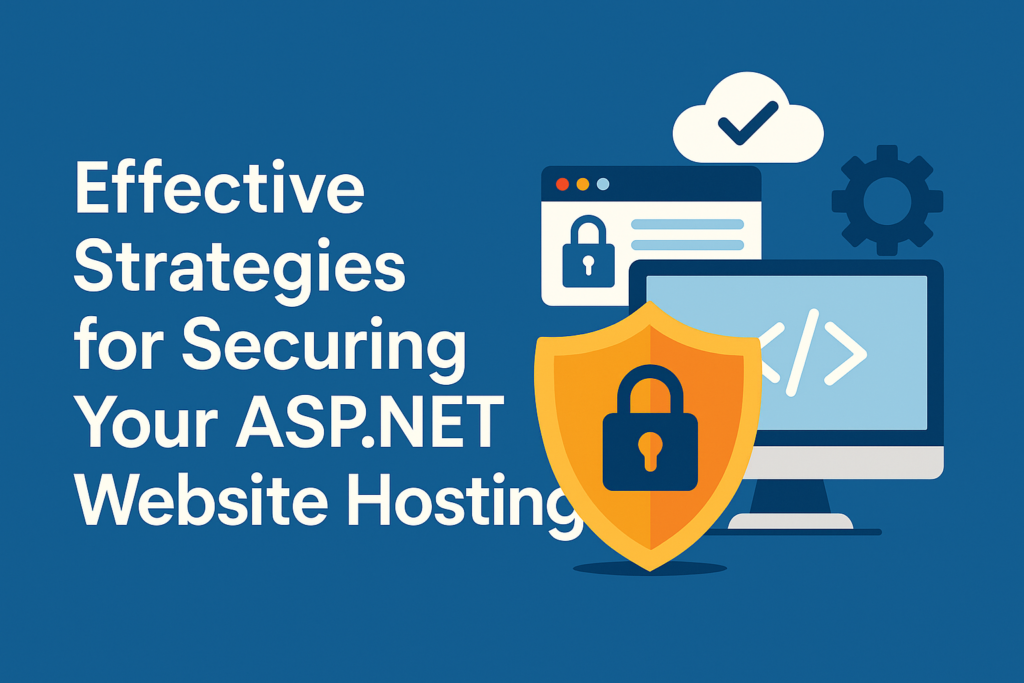SurferCloud ULightHost Starter VPS: Lock in a
Are you tired of jumping from one promotional deal to a...






In today’s digital world, securing your ASP.NET website hosting environment is critical to safeguarding your online presence and protecting sensitive user data. ASP.NET websites, being popular frameworks for dynamic web applications, require a combination of best practices in hosting and application configuration to mitigate vulnerabilities and defend against cyber threats. Following robust security measures not only enhances trust with your users but also helps maintain your website’s integrity and performance over time.

Understanding the Risks for ASP.NET Hosting
ASP.NET applications often face security challenges such as cross-site scripting (XSS), SQL injection, session hijacking, and unauthorized access attempts. Many of these vulnerabilities stem from misconfigurations in the hosting environment or poorly implemented security controls within the application itself. Since hosting providers manage the server and network infrastructure, ensuring a secure hosting setup is foundational before focusing on application-level security.
Choose a Secure Hosting Environment
Begin with selecting a reputable hosting provider that offers dedicated security features for ASP.NET applications. Look for environments that provide the latest Windows Server versions with built-in security patches, strong firewall configurations, and intrusion detection systems. Using isolated or dedicated hosting, such as virtual private servers or cloud-based dedicated instances, reduces the risk of shared environment breaches common in shared hosting.
Enable SSL/TLS Encryption
Encrypting data transmitted between your website and users is essential to prevent eavesdropping and man-in-the-middle attacks. Enforce HTTPS by installing SSL/TLS certificates on your hosting server. Modern browsers flag unencrypted sites as insecure, which can harm your website’s reputation and SEO ranking. Configuring HTTP Strict Transport Security (HSTS) further ensures that browsers only connect securely.
Implement Strong Authentication and Authorization
ASP.NET offers built-in mechanisms for user authentication and role-based authorization, which should be fully utilized. Use strong password policies, multi-factor authentication (MFA), and limit login attempts to prevent brute-force attacks. Role management controls should be carefully designed to restrict access to sensitive functions based on user privileges.
Keep Your Server and Framework Updated
Regularly update your Windows Server, IIS (Internet Information Services), and the ASP.NET framework itself to incorporate security patches and improvements. Outdated software often harbors vulnerabilities that attackers exploit. Enabling automatic updates or setting up a schedule for manual updates is vital to maintaining a secure environment.
Secure Configuration of IIS
Internet Information Services (IIS), the default web server for ASP.NET, needs proper configuration to reduce attack surfaces. Disable unnecessary modules and features that your application does not use. Restrict directory browsing, implement request filtering to block malicious HTTP requests, and configure logging to monitor suspicious activities. Additionally, apply URL authorization rules to control access effectively.
Use Web Application Firewalls and DDoS Protection
Web Application Firewalls (WAFs) add an extra security layer by filtering and monitoring HTTP traffic to and from your web application. Many hosting providers include WAF services tailored for ASP.NET applications to detect and block common attacks like SQL injection and cross-site scripting. Complement WAFs with DDoS mitigation solutions to protect against traffic floods aimed at disrupting your website.
Protect Sensitive Data and Secrets
Never store sensitive information such as database connection strings, API keys, or passwords in plain text within your application code or configuration files. Use ASP.NET’s built-in encrypted configuration sections or secure vault services provided by your hosting provider. Properly securing these secrets prevents data leaks if your hosting environment is compromised.
Backup and Disaster Recovery Plans
Regularly backing up your website files and databases ensures you can quickly restore your site in case of data loss or ransomware attacks. Hosting providers often offer automated backup solutions, but having an offsite backup strategy is recommended for added security. Test your recovery process periodically to verify data integrity and availability.
Monitor and Audit for Security Incidents
Continuous monitoring of your website and server logs helps detect anomalies and unauthorized access attempts early. Use monitoring tools and set alerts for unusual activities such as repeated failed login attempts or changes in critical files. Performing regular security audits and vulnerability scans identifies weaknesses before attackers exploit them.
By following these security best practices for ASP.NET hosting, website owners can significantly reduce their exposure to cyber threats and provide a safer experience for their users.
At SurferCloud, we specialize in delivering secure, high-performance cloud servers optimized for ASP.NET applications. Our hosting solutions include advanced security features, automatic updates, SSL support, and proactive monitoring to help you focus on growing your web presence without worrying about infrastructure risks. Visit www.surfercloud.com to explore how our reliable cloud hosting can empower your ASP.NET website with peace of mind and superior performance.
| Plan | Price | CPU | Memory | Storage | Bandwidth | IP | OS |
|---|---|---|---|---|---|---|---|
| Essential | $9.9/year | 1 vCPU | 1GB RAM | 40GB NVMe Disk | 30M Bandwidth | 1 Dedicated IPv4 | Linux/Windows |
| Starter | $1.9/month | 1 vCPU | 2GB RAM | 40GB NVMe Disk | 30M Bandwidth | 1 Dedicated IPv4 | Linux/Windows |
| Plus | $2.9/month | 2 vCPU | 2GB RAM | 60GB NVMe Disk | 30M Bandwidth | 1 Dedicated IPv4 | Linux/Windows |
| Ultimate | $3.9/month | 2 vCPU | 4GB RAM | 80GB NVMe Disk | 30M Bandwidth | 1 Dedicated IPv4 | Linux/Windows |
Are you tired of jumping from one promotional deal to a...
Looking for high-performance, affordable cloud servers ...
At SurferCloud, we're dedicated to giving you diverse c...